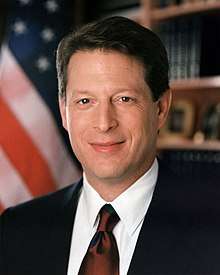Atari Democrat
In 1980s and 1990s US politics, the phrase Atari Democrat refers to Democratic legislators who suggested that the support and development of high tech and related businesses would stimulate the economy and create jobs. The term refers to the Atari brand of video game consoles and arcade machines, which was prominent in the 1980s.
Definition
A 1983 San Jose Mercury News article defined "Atari Democrats" as "smart young congressmen who sought to make the restoration of American business their issue".[1] A 1984 article in The Philadelphia Inquirer defined the term as "a young liberal trying to push the party toward more involvement with high-tech solutions."[2] It also noted that, "Since July 1982, it has appeared in The New Yorker, Business Week, Fortune, Time and [...] in The Wall Street Journal."[2] A few years later, in 1989, The New York Times suggested that Atari Democrats, now also known as "Democrats' Greens", were "young moderates who saw investment and high technology as the contemporary answer to the New Deal."[3] The Times also discussed a generation gap which developed during the 1980s between older liberals who maintained an interest in traditional visions of social liberalism and Atari Democrats who attempted to find a middle ground:
When the Atari Democrats first emerged in the early Reagan years, their commitments to free markets and investment won them much criticism from older liberals, who considered their neo-liberalism as warmed-over Reaganism. Mr. Leahy, who combines his environmentalism with an old-fashioned commitment to social programs, argues that the cutbacks of the Reagan years suggested that it had been a mistake for members of his Congressional class to take the old programs for granted. But some of the Atari Democrats argue that their commitment to innovative uses of markets and to the environment are complementary. Mr. Wirth, for example, has sought to bring his two passions together by arguing that market forces can be harnessed to protect the environment and work better than 'command-and-control regulations.'[3]
Politicians
Specific individuals have been identified with Atari Democrats. Al Gore's "passion for technological issues, from biomedical research and genetic engineering to the environmental impact of the "greenhouse effect," linked him with other technological politicians on Capitol Hill known as Atari Democrats."[4] TIME magazine noted that Tim Wirth "made a reputation as the typical "Atari Democrat," who urges growth and investment in high-technology industries."[5]The New York Times referred to Paul Tsongas as an Atari Democrat, "a member of the young generation of politicians and economists who looked to high technology as a source of jobs and economic growth."[6] Gary Hart also referred to himself as an Atari Democrat and stated, "I was, early on in my Senate career, described as an Atari Democrat. No one would know what that means because there are no more Ataris, but we were among the first - a small group of us to forecast the transition of the economy from industrialized manufacturing to the information age."[7]
Notes
- Hubner, John; Kistner, William F. Jr. (1983-11-28). "What went wrong at Atari?". InfoWorld. San Jose Mercury News. p. 151. Retrieved March 5, 2012.
- Tynan, Trudy (August 23, 1984). "DICTIONARIES ' EDITORS MINE A MOTHER LODE-POLITICS". The Philadelphia Inquirer (Associated Press): C09.
- DIONNE, E.J. (June 14, 1989). "Greening of Democrats: An 80's Mix of Idealism and Shrewd Politics". The New York Times. Retrieved 2008-06-28.
- "Albert A. Gore, Jr., 45th Vice President (1993–2001)". senate.gov. Archived from the original on 30 June 2008. Retrieved 2008-06-22.
- "NEW FACES IN THE SENATE: Atari Democrat". TIME. Nov 17, 1986. Retrieved 2008-06-29.
- Pear, Robert (Feb 25, 1992). "THE 1992 CAMPAIGN: Record in Congress; In House and Senate, Tsongas Went His Own Way". The New York Times. Retrieved 2008-06-28.
- "Gary Hart pitches for president". CNN. February 28, 2003. Retrieved 2008-06-28.

